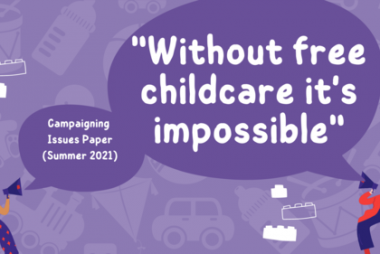
The government is expanding its free childcare support from April 2024 and we’re happy to see the hard work of campaigning across the country on unaffordable childcare make an impact!
The new changes are…
From April 2024, working parents of two-year-olds will be able to access 15 hours of free childcare.
From September 2024, 15 hours of free childcare will be extended to all children from the age of nine months.
From September 2025, working parents of children under the age of five will be entitled to 30 hours free childcare per week.
How it all started in Nottingham
Unaffordable childcare costs and its impact on women’s ability to work was identified as an issue by the policy team of Nottingham Women’s Centre in summer 2021 when almost 75% of Nottingham women surveyed said the cost of childcare affects how much they can work and that unaffordable childcare was driving them out of the workplace.
The average cost of a full-time nursery place is £263 a week, which is over half the average wage. Although childcare affects all parents, the impact of unaffordable childcare is disproportionately felt by women as the primary carers.
What we did in Nottingham
We developed a policy brief advocating for measures to improve the accessibility, affordability and flexibility of childcare. With the support of Cllr Rebecca Langton, this policy brief led to a Full Council motion at Nottingham City Council. You can read that motion in full here.
Working collaboratively with Nottingham City Council, we then:
- Developed an Inclusive Recruitment guide with information for employers on childcare support available for employees and benefits of recruiting inclusively. This guide has since been approved by the East Midland Chamber of Commerce.
- Lobbied for sustained change on the high cost of childcare.
- Promoted local support available for childcare through Families Information Service (FIS) online and within the city sending flyers and newsletters to job hubs and Department of Work and Pensions (DWP). Visit the FIS website here for more information on childcare support.
- Reveiwed Nottingham Council’s employment policies to examine its commitment to becoming an exemplar employer of women with childcare responsibilities.
- Conducted surveys and listening circles with over 90 female participants who have caring responsibilities. The findings from our surveys and listening circles provided a powerful insight into the experiences of women with childcare and employment.
- Used the findings from our surveys and listening circles, we submitted evidence to the Parliamentary Education Committee. This evidence was accepted by the Committee and published here.












